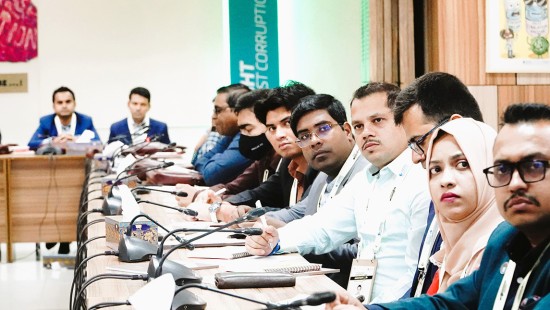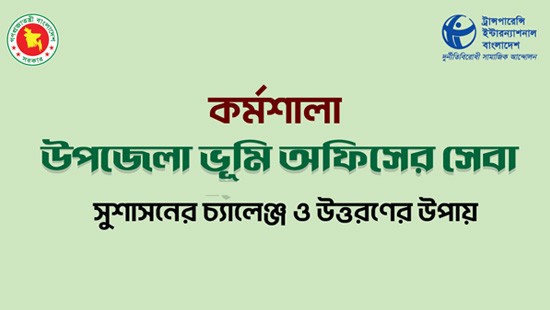Published: 22 September 2025
Krisna Munda Kabeya is one of only three students from her village in Habiganj district to pursue higher education at one of the country’s prestigious public universities—Jahangirnagar University. Currently a third-year student in the Department of History, she grew up amid hardships, as her father was a tea laborer, a profession where the monthly income is around 36 US dollars in Bangladesh. In her community, education is a luxury. Many of her friends could not cope with the struggles of life and dropped out of school early. However, Krisna persevered thanks to her determination and the unwavering support of her strong-willed father, who refused to bow to social pressures and instead encouraged his daughter to break barriers.
On Sunday, September 21, 2025, Krisna participated in a training on “Right to Information Act, 2009 and Land Rights” at Transparency International Bangladesh (TIB)’s Dhaka office, representing the marginalized Munda community of Bangladesh. The training was organized by TIB in association with the indigenous rights–based organization Kapaeeng Foundation, and brought together youth from nine diverse indigenous communities to contribute to the broader goals of transparency, accountability, and good governance while empowering their communities. Close to 30 indigenous youth like Krishna participated in the training event.
Pallab Chakma, the Executive Director of Kapaeeng Foundation and a key partner in the training initiative, emphasized the significance of organizing training focused on RTI and land rights. He highlighted that these sessions empower indigenous youth to enhance their capacity to protect their rights at the grassroots level. Pallab Chakma further advocated for the necessity of conducting this training outside of Dhaka, ensuring that a higher number of indigenous students from rural areas can take advantage of these invaluable learning experiences.
The day-long program was enriched by the vibrant presence of indigenous participants, who actively shared their opinions, real-life experiences, and the challenges faced in their communities. They also engaged in group work and gained hands-on knowledge about the Right to Information (RTI) and land rights. The program was divided into two sessions: the morning session on RTI was conducted by Md. Atikur Rahman, Coordinator, Civic Engagement Division, TIB, while the afternoon session on land rights was led by Mohammed Shofiqul Islam, Program Manager, Capacity Building, ALRD. The RTI session covered topics such as the application of the RTI Act, its history, constitutional relevance, the practice of secrecy, and the roles of designated officers and the Information Commission. The land rights session focused on national laws and regulations such as the CHT Regulation of 1900 and the CHT Accord of 1997; international instruments like UNDRIP and ILO Convention 107; traditional land rights in both the plains and the hills; collective land ownership; and the significance of the Chittagong Hill Tracts Land Dispute Resolution Commission.
Surmi Chakma, representing the Chakma community from the hill tracts, also participated in the training. Currently studying Political Science at the University of Dhaka, she actively engaged in the sessions, asking questions and sharing her well-considered opinions. “I know information is our right, but I didn’t know where and how to apply for it. This training has greatly helped me in this regard. Now I can confidently seek information using the Act. I also learned about different laws related to land. As indigenous people, our land rights are often guided by customary practices rather than the existing system in Bangladesh. This knowledge is crucial for us to advocate for our land rights,” she said at the end of the training.
Hailing from Bandarban, one of the hilly districts of the country, Lhameu Marma represented the Marma community at the training. A recent graduate of the University of Chittagong, he echoed Surmi’s reflections. “If I ever find anomalies or allegations of corruption in my area, I now know I can ask for information from local government authorities using the Act, which is truly empowering for our community. In addition, I gained a clear understanding of land-related laws in both the plains and the hills, which will be helpful for advocacy in the future,” said Lhameu, expressing gratitude to TIB and Kapaeeng Foundation.
Speaking at the inaugural session, Dr. Iftekharuzzaman, Executive Director of TIB, highlighted that fundamental rights are essential for a healthy democracy. He noted that the Right to Information Act plays a key role in safeguarding these rights, though its use alone cannot guarantee full equality or democracy. The Act empowers citizens to ask questions and seek accountability—for instance, why corruption occurs or why land rights are violated. Under the RTI Act, 2009, citizens are legally entitled to demand answers, ensuring that communities can better understand and challenge the reasons behind such injustices, such as irregularities in teacher recruitment.
Dr. Sumaiya Khair, Adviser, Executive Management, TIB, underscored that while land rights and the RTI Act are essential tools, their true value lies in applying them in real life. She expressed hope that participants would use the lessons from this training to actively protect and claim their rights.
As the event concluded with certificate distribution, group photos, and lively networking among the youth, our honorable guests sought feedback on the training. It was then that Krisna Munda shared her thoughts, “There were many topics I did not know about regarding the Right to Information and land rights. Now, I know how to officially request information if access is restricted. This knowledge is worth sharing with the youth in my tea garden community.”
























